Twin Capes
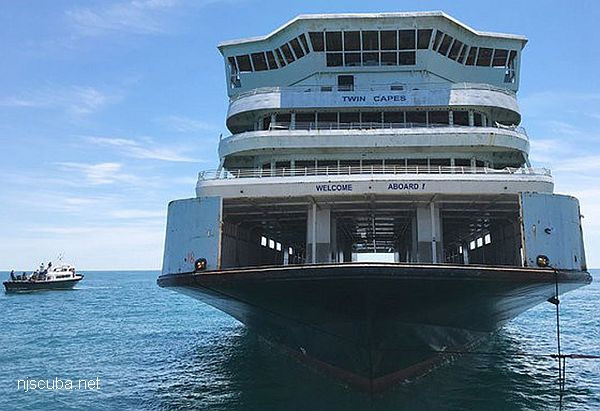
- Type:
- artificial reef, ferry
- Built:
- 1975, Todd Houston, Houston, TX
- Specs:
- ( 320 x 68 ft ) 2,139 tons
- Sunk:
- Friday, June 15, 2018 - DelJerseyLand Artificial Reef
- GPS:
- 38°30.882' -74°30.848'
- Depth:
- 125 ft
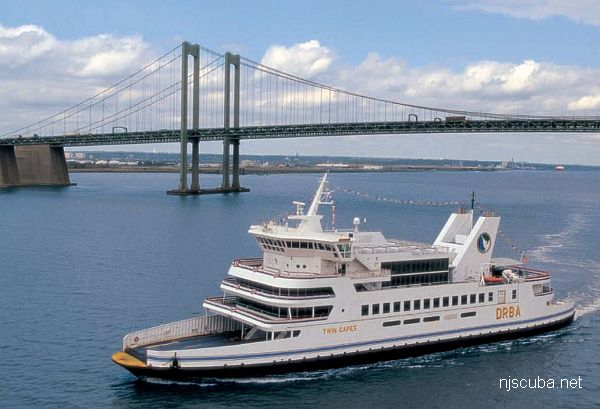
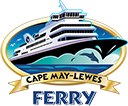
Twin Capes was the last of three sisters, along with Delaware and New Jersey, built at Todd Shipyards for the Delaware River & Bay Authority. In 1996, the Twin Capes underwent an extensive upgrade which added extra decks and facilities, essentially turning her into a miniature cruise ship. The conversion was not a success, the extra weight and added crew increased her operating costs, and the money-losing ferry was taken out of service and put up for sale while her unmodified sisters carried on.
After five years there were no takers, and the vessel was sold for $250,000, a fraction of the original $10 million assessment, to sink as an artificial reef. Another $800,000 went into preparation, although some of that must have been recouped through salvage.
From the photos, it is apparent what a magnificent reef this vessel would make, with a total height of 70 feet. Unfortunately, it appears to have flipped over during sinking. With just an 8 foot draft and a massive extended superstructure, this was a distinct possibility, and it's not hard to see how it happened in the video. The superstructure is wide-open and floods very quickly, while the hull has just a few small holes cut in it, and floods much more slowly.
A vessel's stability, or tendency to right itself from rolling, comes from the shape of the hull and its interaction with the surface of the water. If the vessel sinks below the surface or rolls too far, that stability is lost, gravity and drag take over and re-orient it in the fastest sinking position. In this case, the hull formed a large buoyant air pocket, exacerbating the problem, and the vessel flipped completely over. Look at the entry on the Shearwater, exactly the same thing happened.
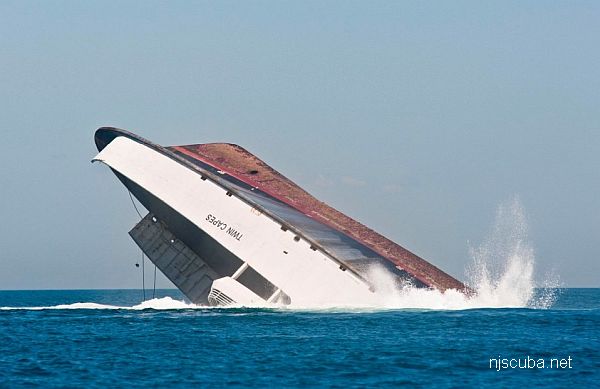
The solution would be to make the holes in the hull much larger so that it floods faster and does not become an air pocket. But the Twin Capes had to be delivered from Norfolk Virginia, a long ocean tow that would have been very risky with large holes cut in the hull. Large holes can be pre-cut so that just a little more cutting will open them up. I see plenty of deck area on this ferry where this could have been done. However, a faster sinking is riskier for any workers on board at the end.
On the other hand, this is one of the fastest sinkings of a vessel this size on record. In this case, it appears that by the time the stern has hit the bottom, the superstructure is already so far over that there is no chance of righting itself. At this point, the hull is still half full of air and pulls the vessel completely over. I'm not sure anything could have prevented this outcome, but hopefully, some lessons will be learned from it.
If the Twin Capes is completely over, which it appears to be, the hull will push the superstructure down into the mud and ultimately crush it flat, leaving just a big lump on the bottom. The situation is much better if it is on its side. The final condition awaits future dive reports, if there ever are any. A side-scan sonar image could also confirm the vessel's position.
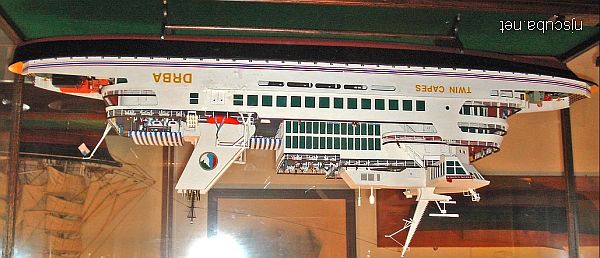

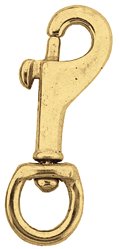
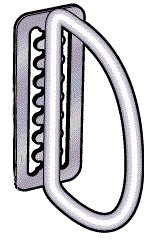
Questions or Inquiries?
Just want to say Hello? Sign the .